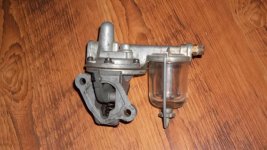
Tim, first I am assuming you still have the mechanical fuel pump.
I have owned my 1933 Chevrolet for over 43 years and had the same problem with it approximately 20 years ago. It does not have a fuel filter and personally I don't feel it or the TR4 needs one, which I will talk about in a minute.
I checked the following items in the order listed.
1. Carburetor - absolutely no problems
2. Fuel pump bowl had a few rather large chunks of rust - removed bowl and mesh screen and cleaned both, but still had the problem.
3. Removed the fuel pump and gas tank ends of the fuel steel fuel line and blew at out with compressed air - bingo, all kinds of junk came out and was the cause.
Later I removed the gas tank then cleaned and sealed it with a Bill Hirsch gas tank sealing kit (
https://www.hirschauto.com/products.asp?dept=4 ). I have had no problems since.
Vaper Lock, yes that could be a problem, especially if you are using ethanol fuel. I am lucky and have a gas station nearby that still sells ethanol free gas. Ethanol is more prone to vapor lock on these older cars since the fuel system is not pressurized like modern cars. Also on modern cars the fuel that bypasses the pressure regulator returns to the gas tank which also eliminates vapor lock.
Some of my Chevrolet friends have used fuel filters and had some of the problems mentioned in the postings above.
Personally I have never used a filter on my cars that did not have them from the factory and I have never had a problem. Yes, modern fuel injected cars need fuel filters to filter the very small particles that may clog the fuel injectors. Did you even look at the size of the fuel passages on the triumph carburetors, they are huge and anything that gets part that screen mess in the fuel pump will not clog any part of the carburetor. Same with my 1933 Chevy.
The attached AC fuel pump photo looks similar to the TR4 fuel pump, but it is actually a spare I have for my 1933 Chevrolet and most of the parts are exactly the same. The main difference is the angle the bottom have is bolted to the top and the angle the outlet pipe comes out of the pump.
In my opinion, the filter screen along with the sediment bowl on the original Triumph fuel pump is more than sufficient to filter the fuel for the Triumph TR4 carburetors. If you need a new filter screen, glass bowl, or other individual pump parts, may of them are available from
www.fillingstation.com
Vila
1933 Chevrolet
1962 Triumph TR4
1984 BMW 633 CSi

 Hi Guest!
Hi Guest!

 smilie in place of the real @
smilie in place of the real @
 Pretty Please - add it to our Events forum(s) and add to the calendar! >>
Pretty Please - add it to our Events forum(s) and add to the calendar! >> 


